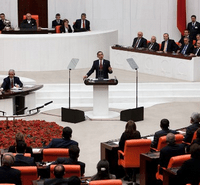ISTANBUL, Turkey -- President Barack Obama ended his recent European tour in Turkey with perhaps his most challenging mission: to repair and reinvigorate the frayed U.S.-Turkish strategic alliance. He left the country with what appears to be a solid new foundation on which to do so, but significant challenges remain ahead. The last eight years certainly have not been kind to the U.S.-Turkey relationship. The U.S. invasion of Iraq in 2003 exposed a deep rift between the two countries. Ankara's opposition to the war culminated in the Turkish Parliament voting down a motion that would have allowed American troops to use the country as a northern launching pad for the attack. The perhaps unprecedented level of distrust between Ankara and Washington that followed was later exacerbated by renewed attacks in Turkey by Kurdistan Workers' Party (PKK) guerillas based in Northern Iraq. Turkey accused the U.S. of not doing enough to put an end to the group's activity. Meanwhile, the increasingly assertive Middle East foreign policy of the Islamic Justice and Development Party (AKP) government was not always welcomed in Washington. Some in the Bush administration saw Ankara's hosting of Hamas political leader Khaled Meshal in 2006, as well as its growing ties with Syria and Iran, as running counter to Washington's policies.
Obama’s Turkey Visit a Good First Step

